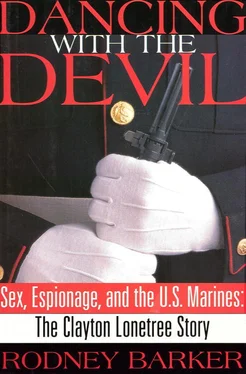After almost two months as lead defense counsel, Mike Stuhff had seen little that had caused him to reconsider his initial assessment of this case. Clayton Lonetree was no innocent. His head swimming in a tangle of espionage books, young love, and delusions of outwitting the KGB, he had done some very dumb things. But it also sounded as if there was a lot of blameworthy negligence to go around, and Stuhff believed absolutely that his client was being made into a larger villain than the facts supported.
As he put it together, for years people in the upper levels of government had been aware there were significant security problems at the American Embassy in Moscow and had failed to do anything to rectify the situation; the system that had allowed conditions to continue unchecked should be blamed for this whole sordid affair, not Clayton Lonetree.
Stuhff believed that the CIA—masters in deceiving and disrupting an enemy population, specialists in “disinformation”—was happy to be able to blame its intelligence losses on a Marine security guard, because it had been embarrassing to have them attributed to Edward Howard, a defector from its own ranks. He thought that the State Department, which had done little to improve its understanding of security problems or to take measures to protect U.S. missions and its employees from an identified threat, and was now feeling the heat from Congress for allowing the KGB to be the general contractors on the new embassy building, welcomed this opportunity to divert attention away from its gross dereliction. And he suspected that the Reagan administration, concerned about the widening implications of the Iran-Contra arms-for-hostages scandal and desperately searching for a newsworthy distraction, had seized on the Marine Sex-for-Secrets scandal as a windfall.
This was why his client was being abused by the system, he thought. And if that did not add up neatly to a conspiracy, the configuration looked at least like a community of interests among a number of agencies and officials, all with their own reasons and motives, who had come together and decided to make this Marine a scapegoat for their own failings.
Given his faith in this scenario and the amount of prejudicial publicity that was mounting because of the Bracy allegations, Stuhff and Kunstler decided that, during the three-week recess from the Article 32 hearing, they should initiate aggressive measures to neutralize the hostility against their client. It was time to come out of their corner, swinging.
This was William Kunstler’s bailiwick. He liked to try cases in the public arena. He felt it was important for all defense lawyers in highly visible and controversial cases to understand that sometimes their only escape, only help, was the press. In this case Kunstler felt that the prosecution had a big jump on the defense. No less an authority than the President of the United States, seconded by the Secretary of Defense, had made sweeping statements condemning his client before he’d had his day in court. The Daily News, the largest-circulation paper in New York, had run a front-page article, “Pentagon Claims Marines Led Reds on Spy Tour,” with a picture of Sergeant Lonetree and Corporal Bracy.
In a series of interviews with wire-service reporters and major newspapers, Kunstler set out to recast the public image of his client as a “traitorous spy.” While conceding that Clayton Lonetree did have unauthorized contacts with Violetta and Uncle Sasha, Kunstler insisted that he gave the Soviets nothing of value and did not believe he was betraying his country. He said he wasn’t even sure that Lonetree’s offenses rose to the level of espionage. And he initiated a series of actions and statements that were vintage William Kunstler.
In the best of all situations, he preferred to represent an angry, aggressive defendant who had a political agenda and took a strong interest in what was happening, but by this time he knew Clayton Lonetree was no Russell Means or Dennis Banks. Just how square Lonetree was struck Kunstler when he dropped their names and Lonetree gave him a blank stare. He didn’t know who Kunstler was talking about. The one plus to having an uninformed and apolitical client, however, was he allowed his attorney to improvise.
Among the Indian militants he had defended over the years, Kunstler felt he had made a number of lifelong friends, and he got on the phone to some of them in an attempt to martial support for Clayton Lonetree from Native America. It was a logical place to go, and a certain amount of sympathetic activity had already been generated in Indian country. Clayton Lonetree defense funds had sprung up in hot spots around the country known to embrace Indian causes, where this was received as a familiar story of government persecution of Native American people and Lonetree was viewed as a political prisoner as undeserving of incarceration, in their opinion, as Leonard Peltier.
But the response from Native America, and Native American veterans in particular, was by no means unanimous or uncomplicated. In the minds of the patriotic Navajo Code Talkers, decorated for their actions in World War II, if Lonetree was not a traitor then at the very least he had disgraced their proud tradition of service. When Sally Tsosie asked the Navajo Tribe for money to help pay the legal costs of Clayton’s defense, the Navajo Veterans Commission recommended she be turned down. And when Spencer Lonetree’s sister, Kathy Lonetree, attempted to organize rallies to raise money for the financially strapped defense team, the turnout was a major disappointment. The rally in Denver produced $612, and one in St. Paul fared worse, netting $220.
Kunstler would have far better luck when it came to attacking what he perceived as a double standard in the superstar status accorded to Lt. Col. Oliver North. In an op-ed piece published in the Los Angeles Times, Kunstler drew a vivid picture of North as a renegade who hid behind the Fifth Amendment when testifying before the House Intelligence Committee about the unlawful diversion of arms-sales proceeds from Iran to the Nicaraguan Contras, who shredded pertinent documents, who publicly admitted to a number of serious federal crimes, and who yet was walking around a free man, “flatteringly portrayed by the press and his supporters as a dedicated soldier, a consummate patriot and loyal subordinate… a devoted husband and father.” All the while this was going on, dramatically different and “medieval conditions of confinement” had been imposed on the other Marine in the news, Sgt. Clayton Lonetree, who had not been caught in the middle of any wrongdoing but who voluntarily had gone to the authorities with his story and yet had spent almost four months in captivity.
These issues were clearly going to be raised in the Lonetree defense come the court-martial, but in the meantime the defense team decided another culprit needed to be targeted, which is how they came to gang up on the Naval Investigative Service. In their minds the NIS was a besmirched organization looking for a way to polish its reputation, staffed by cowboy agents willing to go to any lengths to secure confessions. For the defense team, the telling moment in the investigation had come in London, when NIS agents, not satisfied with Sergeant Lonetree’s voluntary statement, encouraged him to “Tell me anything, tell me a lie.” That said to them that the Naval Investigative Service had already made a determination as to what was going on, and the interrogators had concrete ideas about what they were looking for even as they were in the process of formulating questions. And the way that translated in Kunstler’s mind was that the NIS, rather than developing an espionage case against Clayton Lonetree based on the facts, had begun with a preconceived notion and was less interested in finding out what happened than in confirming their theories.
Читать дальше












